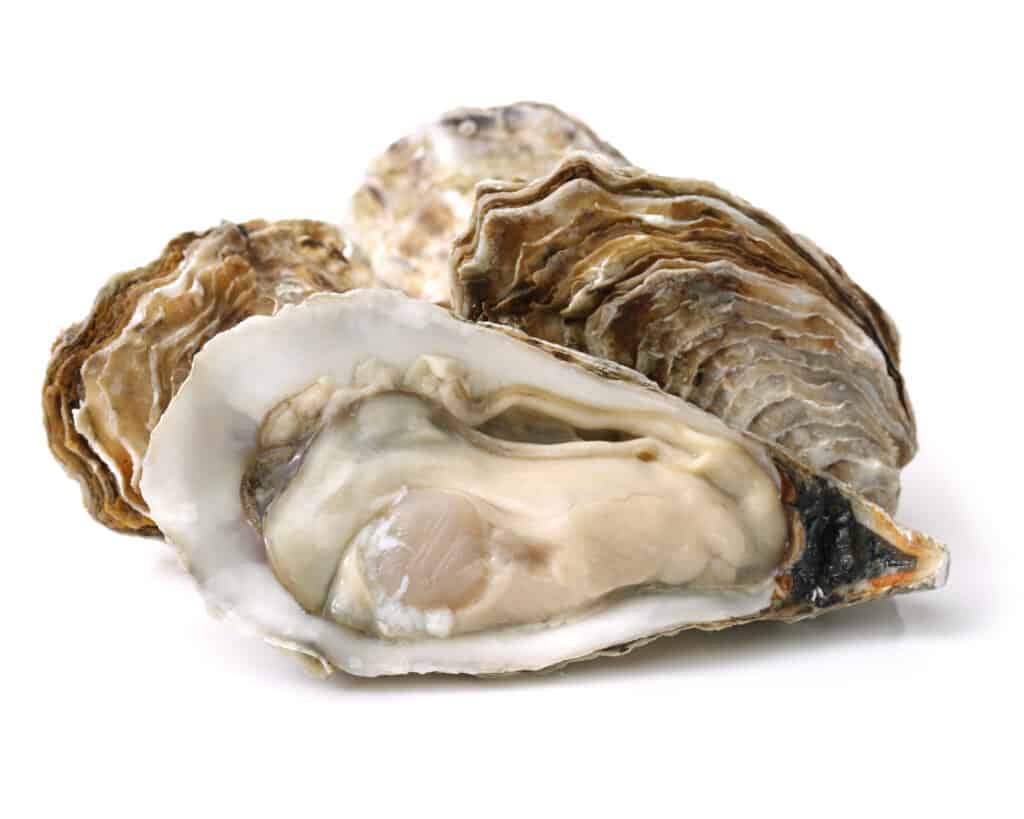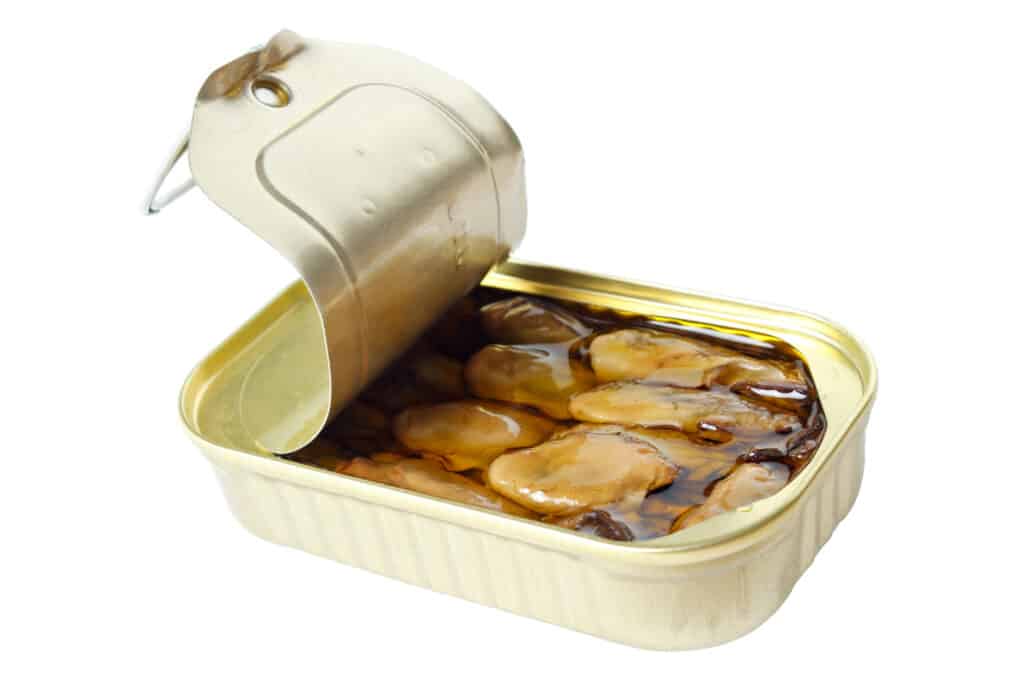Oysters are a seafood delicacy in which many humans delight, prompting those who own dogs to ponder whether or not their dog might enjoy an occasional oyster. Pups will be pleased to know that when served in moderation, oysters provide an excellent amount of protein and confer several other health benefits to your puppy. However, this applies only to oysters that are adequately cooked and free of seasoning.
Read on to learn more about oysters as a healthy, special treat for your dog and what to keep in mind when sharing oysters with your furry friend.

Pups will be pleased to know that when served in moderation, oysters provide an excellent amount of protein.
©JIANG HONGYAN/Shutterstock.com
Can Dogs Eat Oysters?
Simply put, dogs can eat oysters which make a tasty and nutrient-rich treat. The main caveat is to only give your dog cooked oysters, whether they’re canned or purchased raw from a grocery store. Avoiding raw oysters helps prevent your pup from accidentally consuming harmful bacteria, which can cause salmonella or other food-borne illnesses.
Steaming or purchasing pre-cooked oysters in a can are two of the best options for giving your pup oysters. Steer clear from fried oysters, as the fat content in oils is often too high for most dogs’ diets. Smoked oysters also contain additives and preservatives, potentially harmful to dogs. And finally, make sure to remove the oysters from their shells before serving, as these can present a choking hazard to your pup or block its intestinal tract.

Steaming or purchasing pre-cooked oysters in a can are two of the best options for giving your dog oysters.
©Ari N/Shutterstock.com
Can raw oysters hurt dogs?
Even with high-grade, sushi-quality seafood, you should avoid feeding raw oysters or fish to your dog. Raw oysters can contain bacteria that may put yourpup at risk for salmonella or other diseases. When prepping your dog’s dish, use safe food handling measures and keep other foods separate from raw fish.
Benefits of Oysters for Dog
- Oysters contain high protein levels, an essential nutritious building block, keeping your puppy happy and healthy. Protein keeps muscles functioning, helps repair them, and provides the energy necessary to walk, play, and enjoy daily life.
- As a seafood, oysters are also very high in omega-3 fatty acids. Each three-ounce serving contains between 500 to 1,000 milligrams of omega-3s. These are essential in regulating inflammation, maintaining healthy joints, and keeping coats and nails healthy and strong.
- Oysters also contain high levels of iron, zinc, and selenium, all essential minerals to support joint function, thyroid health, and energy levels.
- Oysters offer an excellent alternative for pupswith food allergies to other types of protein, such as chicken or beef.

Oysters offer an excellent alternative for dogs with food allergies to other types of protein, such as chicken.
©iStock.com/adogslifephoto
Risks of Feeding Dogs Oysters
- Your dog has the potential to be allergic to any new food and oysters are no exception. When introducing your dog to oysters, be sure to feed them a small amount, slowly increasing it over time. There’s always a possibility of food allergy or sensitivity, so it’s best to start with a small amount as a test.
- Oysters are generally healthy for our canine companions, but it’s always possible to overdo it. Be sure to keep oysters a small part of your dog’s diet and feed in moderation, or there’s a risk of your pet becoming overweight.
- Oysters are natural waste feeders which can absorb toxins in the water that may be dangerous to your dog. To minimize the chance of food-borne illness, source your oysters from clean, cold waters, and when in doubt, ask your fishmonger to test toxicity levels in their catch.
How to Feed Your Dog Oysters
As with any new food, it’s best to introduce oysters to your pet’s diet by starting slowly and gradually increasing as you observe the effects. Many dogs can have sensitive stomachs that react to sudden changes in their diets.
Be sure to remove the oysters from their shells and then cook them by steaming, roasting, or grilling them. Cooking the oysters will eliminate any risk of toxins or microorganisms that could make your pup sick. Again, avoid frying the oysters or seasoning them with any spices, as oils and batter can make your dog gain weight.

Do not feed your pup fried oysters, or ones flavored with seasonings.
©stockcreations/Shutterstock.com
You can also purchase tinned oysters from the store, as long as they’re packed in water instead of brined or in oil and free from seasoning. Regarding portion sizes, your veterinarian can recommend how many and how often you should feed this delectable treat to your dog. While oysters are a well-rounded component of a dog’s diet, they should not be the only food.
Oysters are a delectable, protein-rich, and nutrient-dense food that can fit well in any canine’s diet. With moderation and a degree of prep, your canine best friend can sit and enjoy this seafood delicacy by your side.
Up Next
The photo featured at the top of this post is © PHIL LENOIR/Shutterstock.com
Ready to discover the top 10 cutest dog breeds in the entire world?
How about the fastest dogs, the largest dogs and those that are -- quite frankly -- just the kindest dogs on the planet? Each day, AZ Animals sends out lists just like this to our thousands of email subscribers. And the best part? It's FREE. Join today by entering your email below.
Sources
- ncbi.nlm.nih.gov, Available here: https://www.ncbi.nlm.nih.gov/pmc/articles/PMC4710035/
- ncbi.nlm.nih.gov, Available here: https://www.ncbi.nlm.nih.gov/pmc/articles/PMC7915357/
- a-z-animals, Available here: https://a-z-animals.com/blog/fish-that-are-safe-for-dogs-to-eat/
- a-z-animals, Available here: https://a-z-animals.com/blog/can-dogs-eat-spicy-food-safely-what-happens-if-they-do/
- frontiersin.org, Available here: https://www.frontiersin.org/articles/10.3389/fvets.2021.667318/full
Thank you for reading! Have some feedback for us? Contact the AZ Animals editorial team.






